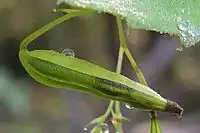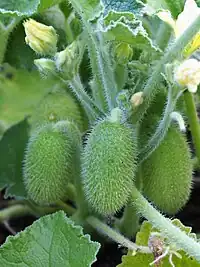noli me tangere
English
Etymology
| PIE word |
|---|
| *ne |



From Middle English noli me tangere, noly me tangere (“skin disease of the face; bad-tempered person who should be avoided; personification of wrath”),[1] a learned borrowing from Late Latin nōlī mē tangere (literally “do not touch me”), from Latin nōlī (“do not”) + mē (“me, myself”) + tangere (the present active infinitive of tangō (“to grasp; to touch”)). The phrase is recorded in John 20:17 of the Vulgate, a 4th-century Latin translation of the Bible, as having been spoken to Mary Magdalene by Jesus shortly after his resurrection outside his tomb.[2][3] The original phrase was the Koine Greek μή μου ἅπτου (mḗ mou háptou, “stop clinging to me”).
Senses 2–5 refer to the literal meaning of the phrase. For example, in the case of sense 4 (“any of various plants with fruits or seed capsules that, when ripe, burst open and discharge their seeds when touched, or with leaves that fold and droop when touched”), the name alludes to the assumption that the plants do not wish to be touched, and react by exploding their fruits or closing their leaves if this happens.
Pronunciation
- (Received Pronunciation) IPA(key): /ˌnəʊlɪ mɪ ˈtæn(d)ʒəɹi/, /-meɪ ˈtæn(d)ʒəɹeɪ/
Audio (Southern England) (file) - IPA(key): /ˌnoʊli ˌmi ˈtɑnd͡ʒəɹi/, /-ˌmeɪ ˈtɑnd͡ʒəɹeɪ/
- Hyphenation: no‧li me tan‧ge‧re
Noun
noli me tangere (plural noli me tangeres)
- (Christianity, art) A picture depicting Jesus appearing to Mary Magdalene shortly after his resurrection from the dead (see the etymology).
- 1680 September 12 (Gregorian calendar), John Evelyn, “[Diary entry for 2 September 1680]”, in William Bray, editor, Memoirs, Illustrative of the Life and Writings of John Evelyn, […], 2nd edition, volume I, London: Henry Colburn, […]; and sold by John and Arthur Arch, […], published 1819, →OCLC, page 524:
- In the rest of the private lodgings contiguous to this, are divers of the best pictures of the greate masters, Raphael, Titian, &c. and, in my esteeme, above all, the Noli me tangere of our blessed Saviour to Mary Magdalen after his Resurrection, of Hans Holbein [the Younger], than which I never saw so much reverence and kind of heavenly astonishment express'd in a picture.
- 1813, J[ames] N[orris] Brewer, “Oxfordshire [All Souls’ College]”, in The Beauties of England and Wales: Or, Original Delineations, Topographical, Historical, and Descriptive, of Each County. […], volume XII, part II, London: […] J. Harris; […], →OCLC, page 110:
- In a compartment over the communion-table is an estimable picture; a noli me tangere, by [Anton Raphael] Mengs, who painted it at Rome, and parted with it to the college for three hundred guineas.
- 1860, Nathaniel Hawthorne, “The Emptiness of Picture-galleries”, in The Marble Faun: Or, The Romance of Monte Beni. […], volume II, Boston, Mass.: Ticknor and Fields, →OCLC, page 133:
- Half of the other pictures are Magdalens, Flights into Egypt, Crucifixions, Depositions from the Cross, Pietas, Noli-me-tangeres, or the Sacrifice of Abraham, or martyrdoms of saints, originally painted as altar-pieces, or for the shrines of chapels, and wofully lacking the accompaniments which the artist had in view.
- A warning to avoid or not to interfere.
- 1634, William Wood, “Of the Beasts that Live on the Land”, in New Englands Prospect. A True, Lively, and Experimentall Description of that Part of America, Commonly Called New England; […], London: […] Tho[mas] Cotes, for Iohn Bellamie, […], →OCLC, 1st part, page 22:
- The Porcupine is a ſmall thing not much unlike a Hedgehog; ſomething bigger, vvho ſtands upon his guard and proclaimes a Noli me tangere, to man and beaſt, that ſhall approach too neare him, darting his quills into their legges, and hides.
- a. 1676 (date written), John Lightfoot, “A Sermon, Preached from 2 Sam[uel] xix. 29.”, in John Rogers Pitman, editor, Sermons: And Sermon-notes (The Whole Works of the Rev. John Lightfoot, D.D. Master of Catharine Hall, Cambridge; VII), London: […] J. F. Dove, […]; sold by Hatchard and Son, […], published 1822, →OCLC, page 214:
- These difficulties, that are in Scripture, which indeed are not a few,—are not a ‘noli me tangere,’ to drive us from the study of the Scriptures, as the inference would be made,—but they are of another kind of aim and tendency.
- 1806, [James Beresford], “Dialogue the Tenth. Miseries Domestic; including the Dressing-room, and Bed-chamber.”, in The Miseries of Human Life; or The Groans of Samuel Sensitive, and Timothy Testy. […], London: […] [F]or William Miller, […], by W[illiam] Bulmer and Co. […], →OCLC, page 236:
- Then for your eating-accommodations;—dinner dressed by the housemaid, with extempore spits, saucepans, &c. en attendant the arrival of the bonâ fide cook, and her apparatus—every dish, as it is brought in, carrying a "noli me tangere" on the face of it, […]
- 1817 November 15, Lord Byron, “Letter CCCI. To Mr. Murray.”, in Thomas Moore, editor, Letters and Journals of Lord Byron: With Notices of His Life, […], volume II, London: John Murray, […], published 1830, →OCLC, page 153:
- I used to think that I was a good deal of an author in amour propre and noli me tangere; but these prose fellows are worst, after all, about their little comforts.
- 1821 September–October, [Thomas De Quincey], “[Part I.] Preliminary Confessions.”, in Confessions of an English Opium-Eater, 2nd edition, London: […] [J. Moyes] for Taylor and Hessey, […], published 1823, →OCLC, page 29:
- [T]he children of bishops carry about with them an austere and repulsive air, indicative of claims not generally acknowledged, a sort of noli me tangere manner, nervously apprehensive of too familiar approach, and shrinking with the sensitiveness of a gouty man, from all contact with the οἱ πολλοι [hoi polloi].
- 1870 May–December, Anthony Trollope, “Sir Harry Hotspur”, in Sir Harry Hotspur of Humblethwaite, copyright edition, Leipzig: Bernhard Tauchnitz, published 1871, →OCLC, page 8:
- He was a proud man, […] showing his pride chiefly by a certain impalpable noli me tangere, which just sufficed to make itself felt and obeyed at the first approach of any personal freedom.
- Someone (such as a disagreeable person) or something (such as a painful experience or taboo topic) to be avoided or not interfered with.
- 1614 June 4 (Gregorian calendar), Richard Neile, quotee, “Proceedings between Lords and Commons, where the Rights and Privileges of either House are Concerned”, in Precedents of Proceedings in the House of Commons: […], new edition, volumes III (Relating to Lords, and Supply), London: […] Luke Hansard and Sons, […] and sold by Payne and Foss, […]; Cadell and Davies, […]; and Clarke and Sons, […], published 1818, →OCLC, pages 48–49:
- On the 25th of May, 1614, the Bishop of Lincoln [Richard Neile] having, in the House of Lords, dissuaded the Lords from agreeing to a conference with the Commons on the subject of impositions, and used this expression, "That the matter of imposition is a Noli me tangere; and that it did not strike at a branch, but at the root and prerogative of the imperial crown;" the House of Commons, after a long and violent debate, […] determine to forbear all proceedings in any parliamentary matter, till they have received an answer from the Lords on this subject.
- 1753, Josiah Tucker, A Letter to a Friend Concerning Naturalizations: […], 2nd edition, London: […] Thomas Trye, […], →OCLC, page 20:
- Religion was only the Pretence;—but Monopoly the Noli me tangere, and the real Cauſe of the Clamours.— […]
- 1816, Egerton Brydges, “Whimzies: or a new Cast of Characters. […], 1631. […]”, in Restituta; or, Titles, Extracts, and Characters of Old Books in English Literature Revived, volume IV, London: […] T[homas] Bensley and Son, […], for Longman, Hurst, Rees, Orme, and Brown, […], →OCLC, page 285:
- Publish'd he would have them (according to the erratas of his life) in folio: but so indigested are his collections, and so illaborate his style, as the stationer shunnes them, like a noli me tangere, fearing their sale.
- 1828, [Edward Bulwer-Lytton], chapter III, in Pelham; or, The Adventures of a Gentleman. […], volume I, London: Henry Colburn, […], →OCLC, page 21:
- There was also Mr. Wormwood, the noli-me-tangere of literary lions—an author who sowed his conversation not with flowers but thorns.
- 1893 November, W. A. Hardaway, “Society Transactions. The American Dermatological Association. Seventeenth Annual Meeting. Held at Milwaukee, Wis., Sept. 5th and 6th, 1893. [A Case of Tuberculosis of the Skin Stimulating Lupus Erythematosus.]”, in John A[ddison] Fordyce, editor, Journal of Cutaneous and Genito-urinary Diseases, volume XI, number 11, New York, N.Y.: D[aniel] Appleton and Company […], →OCLC, page 465:
- I think active cases of lupus are better let alone, they are noli me tangeres.
- Any of various plants with fruits or seed capsules that, when ripe, burst open and discharge their seeds when touched, or with leaves that fold and droop when touched.
- 1597, John Gerarde [i.e., John Gerard], “Of Dioscorides His Blacke Hellebor”, in The Herball or Generall Historie of Plantes. […], London: […] Edm[und] Bollifant, for Bonham and Iohn Norton, →OCLC, book II, page 828:
- There is another plant vvhich hath beene account of ſome to be a kinde of blacke Hellebor, vvhoſe figure vve haue ſet foorth for one of the Arſmarts, called of ſome Impatiens Herba, and others Noli me tangere, […]
- 1725, [Noël] Chomel, “FLORISTS YEAR”, in R[ichard] Bradley, editor, Dictionaire Oeconomique: Or, The Family Dictionary. […], volume I (A–H), London: […] D[aniel] Midwinter, […], →OCLC, column 1:
- Novv ſow the vvild ſpirting Cucumber, and the Noli me tangere in the natural Ground; they are diverting Plants vvhen their Fruit is full ripe.
- [1728, R[ichard] Bradley, “Noli me tangere”, in Dictionarium Botanicum: Or, A Botanical Dictionary for the Use of the Curious in Husbandry and Gardening. […], volume II, London: […] T. Woodward […], and J. Peele […], →OCLC, column 1:
- Noli me tangere, in Engliſh, Touch me not: Is indifferently uſed to any Plant vvhoſe Leaves or Seed vvill ſtart avvay by touching them; ſo the Humble and Senſible Plants may be call'd, becauſe their Leaves contract themſelves by touching them; the ſpirting Cucumber is another ſo call'd, becauſe the Fruit flies in ones Face vvhen vve attempt to gather it: VVe have alſo ſome of the Balſamines, vvhoſe Seedpods vvhen they are ripe, vvill immediately fly avvay upon the Touch.]
- Some plants of the genus Impatiens; specifically, the touch-me-not balsam or yellow balsam (Impatiens noli-tangere).
- Synonyms: impatiens, jewelweed, touch-me-not
- 1778, Thomas Mawe, John Abercrombie, “IMPATIENS, Touch-me-not, and Balsamine, or Balsam”, in The Universal Gardener and Botanist; or, A General Dictionary of Gardening and Botany. […], London: […] G[eorge] Robinson, […]; and T[homas] Cadell, […], →OCLC, column 1:
- There are only tvvo ſpecies of this genera uſually cultivated in the Engliſh gardens, both annuals; one is the Noli me tangere, or Touch-me-not, eſteemed more for the ſingularity of it's elaſtic capſules than beauty of its flovvers […]
- The squirting cucumber (Ecballium elaterium).
- 1778, Thomas Mawe, John Abercrombie, “MOMORDICA, Male Balsam Apple”, in The Universal Gardener and Botanist; or, A General Dictionary of Gardening and Botany. […], London: […] G[eorge] Robinson, […]; and T[homas] Cadell, […], →OCLC, column 2:
- This ſpecies [Momordica elaterium, now Ecballium elaterium] is one of the Noli me tangere, or Touch-me-not kinds, for upon handling the ripe fruit, it inſtantly burſts with elaſtic violence, and diſcharge its juice and ſeeds with amazing force all around to a great diſtance, often cauſing conſternation to ſtrangers vvho happen to touch them.
- (archaic) The sensitive plant (Mimosa pudica), the leaves of which fold inwards and droop when shaken or touched.
- Synonym: touch-me-not
- (medicine, obsolete) Any of various diseases causing ulcers of the skin and underlying tissues, especially of the face; many of these diseases are now thought to be due to basal cell carcinoma or squamous cell carcinoma.
- 1580, Doctor Monardius [i.e., Nicolás Monardes], “Hereafter Followeth a Further Addition of the Hearbe Called Tabaco, Otherwise Called by the Frenchmen Nicotiane, which Hearbe hath Done Great Cures in the Realme of Fraunce and Portugall, as heereafter at Large may Appeare in This Treatise Following”, in John Frampton, transl., Ioyfull Newes out of the Newfound World, […], London: […] [Thomas Dawson for] William Norton, →OCLC, 2nd part, folio 42, verso:
- The ſame Maiſter [Jean] Nicot, hauing caused the ſaid hearb [tobacco] to be ſet in his Garden, where it grewe and multiplied maruellouſly, was vppon a time aduertiſed, by one of his Pages, that a young man, of kinne to that Page made a ſaye of that hearbe bruſed both the hearbe and the Juice together vppon an vlcer, which he had vpon his cheeke neere vnto his noſe, comming of a Noli me tangere, which began to take roote already at the griſtles of the Noſe, wherewith hee founde himſelfe meruellouſly eaſed. Therefore the ſayde Maister Nicot cauſed the ſicke young man to bee brought before him, and cauſing the ſaide hearb to be continued to the ſore eight or ten daies, this ſaide Noli me tangere, was vtterly extinguiſhed and healed: […]
- 1601, C[aius] Plinius Secundus [i.e., Pliny the Elder], “[Book XXV.] Of Pimpernell, Named Anagallis and Corchoros. […].”, in Philemon Holland, transl., The Historie of the World. Commonly Called, The Naturall Historie of C. Plinius Secundus. […], 2nd tome, London: […] Adam Islip, published 1635, →OCLC, page 238:
- After the ſame manner Ariſtolochia together with Cyperus, healeth the ſtinking and illfavored ulcer of the noſe, called Noli-me-tangere.
- 1621 April 11 (Gregorian calendar), Lancelot Andrewes, “A Sermon Preached before the King’s Majesty at Whitehall, on the First of April, A.D. MDCXXI., Being Easter-Day”, in J[ohn] P[osthumous] W[ilson], editor, Ninety-six Sermons […], volume III, Oxford, Oxfordshire: John Henry Parker, published 1841, →OCLC, page 27:
- Other things we feel hurt us, we forbear easily. An angry inflammation there is, the name of it is a noli mi tangere; and not that only, but any boil or sore endures not the touching. What? had Christ any sore place about Him, since His Passion? No; for St. Thomas put his finger, nay, his whole hand into the place of His wounds, and put Him to no pain at all. No place in Christ, for this noli me tangere neither.
- 1771, [Tobias Smollett], “To Sir Watkin Phillips, of Jesus College, Oxon.”, in The Expedition of Humphry Clinker […], volume I, London: […] W. Johnston, […]; and B. Collins, […], →OCLC, page 126:
- This precious aunt of yours is become inſenſibly a part of my conſtitution—Damn her! She's a noli me tangere in my fleſh, vvhich I cannot bear to be touched or tampered with.
Alternative forms
Translations
|
|
|
Notes
- From the collection of the Museo del Prado in Madrid, Spain.
References
- “nōlī mē tangere, n.”, in MED Online, Ann Arbor, Mich.: University of Michigan, 2007.
- “noli me tangere, n. and adj.”, in OED Online
 , Oxford, Oxfordshire: Oxford University Press, March 2022.
, Oxford, Oxfordshire: Oxford University Press, March 2022. - “noli me tangere, n.”, in Dictionary.com Unabridged, Dictionary.com, LLC, 1995–present, reproduced from Stuart Berg Flexner, editor in chief, Random House Unabridged Dictionary, 2nd edition, New York, N.Y.: Random House, 1993, →ISBN.
Further reading
 noli me tangere on Wikipedia.Wikipedia
noli me tangere on Wikipedia.Wikipedia  noli me tangere (disambiguation) on Wikipedia.Wikipedia
noli me tangere (disambiguation) on Wikipedia.Wikipedia  Ecballium on Wikipedia.Wikipedia
Ecballium on Wikipedia.Wikipedia
 Ecballium elaterium on Wikimedia Commons.Wikimedia Commons
Ecballium elaterium on Wikimedia Commons.Wikimedia Commons  Ecballium elaterium on Wikispecies.Wikispecies
Ecballium elaterium on Wikispecies.Wikispecies
 Impatiens on Wikipedia.Wikipedia
Impatiens on Wikipedia.Wikipedia
 Impatiens on Wikimedia Commons.Wikimedia Commons
Impatiens on Wikimedia Commons.Wikimedia Commons  Impatiens on Wikispecies.Wikispecies
Impatiens on Wikispecies.Wikispecies
 Mimosa pudica on Wikipedia.Wikipedia
Mimosa pudica on Wikipedia.Wikipedia
 Mimosa pudica on Wikimedia Commons.Wikimedia Commons
Mimosa pudica on Wikimedia Commons.Wikimedia Commons  Mimosa pudica on Wikispecies.Wikispecies
Mimosa pudica on Wikispecies.Wikispecies
- “noli me tangere”, in The Century Dictionary […], New York, N.Y.: The Century Co., 1911, →OCLC.
- “noli me tangere”, in OneLook Dictionary Search.
